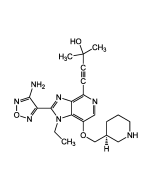Cookie Policy: This site uses cookies to improve your experience. You can find out more about our use of cookies in our Privacy Policy. By continuing to browse this site you agree to our use of cookies.
AdipoGen Life Sciences
A-443654
As low as
90
CHF
CHF 90.00
In stock
Only %1 left
AG-CR1-3663-M0011 mgCHF 90.00
AG-CR1-3663-M0055 mgCHF 270.00

| Product Details | |
|---|---|
| Synonyms | (S)-1-(1H-Indol-3-yl)-3-((5-(3-methyl-1H-indazol-5-yl)pyridin-3-yl)oxy)propan-2-amine |
| Product Type | Chemical |
| Properties | |
| Formula |
C24H23N5O |
| MW | 397.5 |
| CAS | 552325-16-3 |
| Purity Chemicals | ≥98% |
| Appearance | White to off-white solid. |
| Solubility | Soluble in DMSO (15mg/ml), ethanol (10mg/ml) or DMF (20mg/ml). |
| Identity | Determined by 1H-NMR. |
| InChi Key | YWTBGJGMTBHQTM-IBGZPJMESA-N |
| Smiles | N[C@@H](CC1=CNC2=C1C=CC=C2)COC3=CC(C4=CC(C(C)=NN5)=C5C=C4)=CN=C3 |
| Shipping and Handling | |
| Shipping | AMBIENT |
| Short Term Storage | +4°C |
| Long Term Storage | -20°C |
| Handling Advice |
Keep cool and dry. Keep under inert gas. Protect from moisture and oxygen. |
| Use/Stability | Stable for at least 2 years after receipt when stored at -20°C. |
| Documents | |
| MSDS |
 Download PDF Download PDF |
| Product Specification Sheet | |
| Datasheet |
 Download PDF Download PDF |
Description
- Potent and selective Akt inhibitor (Ki=160pmol/L for all three isoforms PKBα, PKBβ and PKBγ).
- DYRK1A inhibitor (IC50=10nM). Inhibits other kinases, including PRK2, MSK1 and DYRK3 at low nM range as well.
- Interferes with mitotic progression by regulating aurora a kinase expression and bipolar spindle formation. It induces G2/M accumulation, defects in centrosome separation and formation of either monopolar arrays or disorganized spindles.
- Anticancer agent. Apoptosis inducer and chemosensitizing agent. Slows the progression and growth of Akt-dependent tumors.
- Induces rapid Akt Ser473 phosphorylation independent of mTORC1 inhibition in human cancer cell lines.
- Activates mTORC2 and reverses long-term memory deficits.
Product References
- Potent and selective inhibitors of Akt kinases slow the progress of tumors in vivo: L. Luo, et al.; Mol. Cancer Ther. 4, 977 (2005)
- Akt inhibitor A-443654 induces rapid Akt Ser-473 phosphorylation independent of mTORC1 inhibition: E.K. Han, et al.; Oncogene 26, 5655 (2007)
- A role for Akt in epidermal growth factor-stimulated cell cycle progression in cultured hepatocytes: generation of a hyperproliferative window after adenoviral expression of constitutively active Akt: Y. Luo, et al.; J. Pharmacol. Exp. Ther. 321, 884 (2007)
- The selectivity of protein kinase inhibitors: a further update: J. Bain, et al.; Biochem. J. 408, 297 (2007)
- Proapoptotic activity and chemosensitizing effect of the novel Akt inhibitor (2S)-1-(1H-Indol-3-yl)-3-[5-(3-methyl-2H-indazol-5-yl)pyridin-3-yl]oxypropan2-amine (A443654) in T-cell acute lymphoblastic leukemia: F. Fala, et al.; Mol. Pharmacol. 74, 884 (2008)
- Akt inhibitor a-443654 interferes with mitotic progression by regulating aurora a kinase expression: X. Liu, et al.; Neoplasia 10, 828 (2008)
- Inhibition of Akt inhibits growth of glioblastoma and glioblastoma stem-like cells: G.L. Gallia, et al.; Mol. Cancer Ther. 8, 386 (2009)
- Akt inhibitors induce apoptosis in chronic lymphocytic leukemia cells: M. de Frias, et al.; Haematologica 94, 1698 (2009)
- An allosteric Akt inhibitor effectively blocks Akt signaling and tumor growth with only transient effects on glucose and insulin levels in vivo: C. Cherrin, et al.; Cancer Biol. Ther. 9, 493 (2010)
- Recent Advances in the Design, Synthesis, and Biological Evaluation of Selective DYRK1A Inhibitors: A New Avenue for a Disease Modifying Treatment of Alzheimer's: B. Smith, et al.; ACS Chem. Neurosci. 3, 857 (2012)
- TORC2: a novel target for treating age-associated memory impairment: J.L. Johnson, et al.; Sci. Rep. 5, 15193 (2015)






